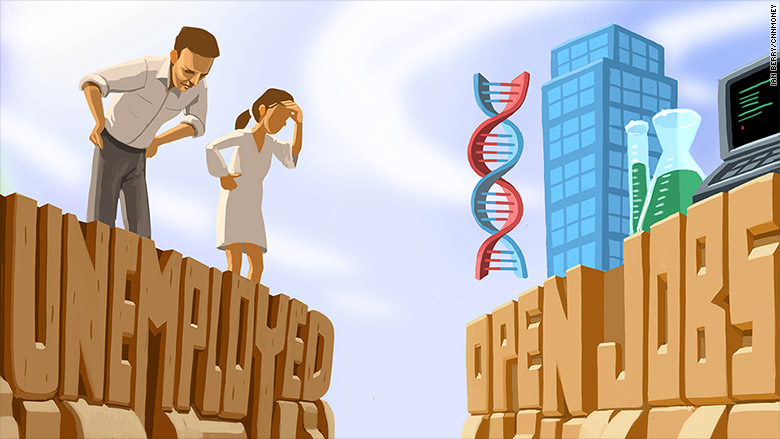
America has millions of jobs openings -- more than any point since 2000.
On the surface, that's a good thing. It means employers are hiring and the economy is growing.
Deeper down though, a high number of job openings raises red flags because it means companies aren't finding the right people to fill the jobs. It signals a persistent problem in America's economy: the skills gap.
Vacant jobs can cost companies hundreds of dollars a day in lost profits, research shows, and ultimately the job skills gap hurts America's economic growth.
The skills gap is a weak spot that you can expect the Republican presidential candidates to hammer in their 2016 campaigns.
Related: The Obama economy has problems. Does the GOOP have answers?
"It's definitely a concern, and it should be a concern for anyone who cares about the future of U.S. workers," says Chris Tilly, an economics professor at U.C.L.A.
There are a number of factors preventing these jobs from getting filled. Experts say that job training programs in the U.S. remain lackluster compared to the country's global peers in Europe and Asia.
Are employers asking too much? But the onus isn't only on unskilled workers to become better prepared. Some employers are arguably raising the bar too high. They want employees who won't require any job training.
Related: Are Republicans becoming econ nerds?
Consider this: 65% of job postings for secretaries who work for executives require a college degree. But among current executive secretaries, only 19% have college degrees, according to Joseph Fuller, a Harvard Business School professor. That's a big gap between expectations and reality.
In a recession, employers can easily raise the bar -- there's lots of job seekers and few jobs. But in a strong job market like the one America has now, that strategy doesn't work, experts say.
"Employers want ready-now people," says Fuller. "As you get to the type of labor market where we're in now, that's not going to be available in a lot of these jobs."
Related: More teens are getting jobs. That's good for everyone.
Another warning sign: There were 5.3 million job openings in America in May, according to the most recent data from the Labor Department. That's better than the meager 2.1 million job openings at the depth of the recession.
However, the rise in job openings is running parallel next to a bad trend: the average number of days a job posting remains available is going up, says Fuller
"That combination is a concern," says Fuller. "We have a chronic shortage of certain skills."
Another bad fact: so far this year, for every job opening, about 30 people apply on average. Of those applicants, less than 20% meet the qualifications for the job, according to Corporate Executive Board, a research group.
Fuller points out one major problem: the "middle skill" job gap. Middle skill jobs are ones that require more experience than a high school diploma but less than a 4-year college degree -- for example, a truck driver.
Related: Unemployment falls to its lowest level in 7 years
The average time a "middle skill" job is open is about 40 days -- that's too high, says Fuller. A normal number would be closer to 20 days.
Fewer Americans have the experience or qualifications for these types of jobs. Tilly argues that too many Americans are going to college, fixated on the idea that a college degree is the only way to make big bucks.
"I can't solve the problems that my plumber and my electrician can solve," says Tilly. In those jobs: "You can make a fair amount of money."


